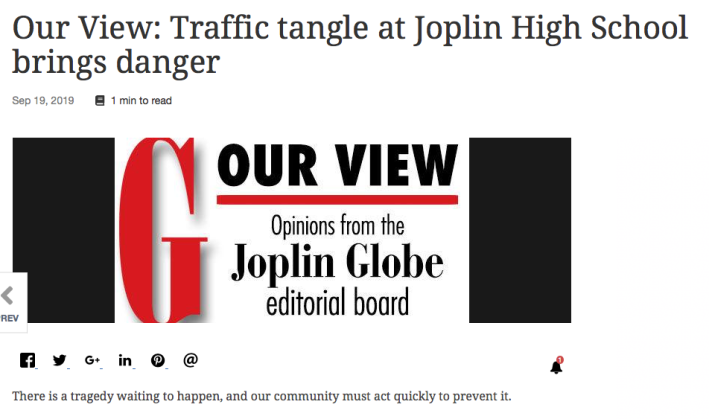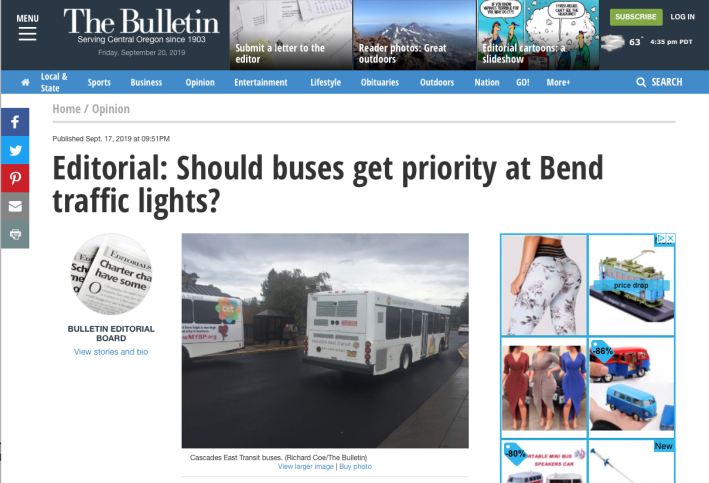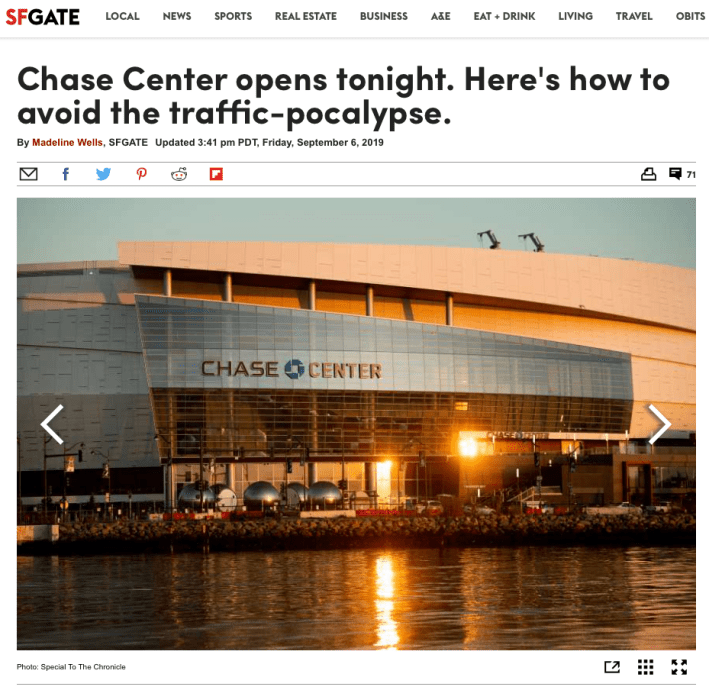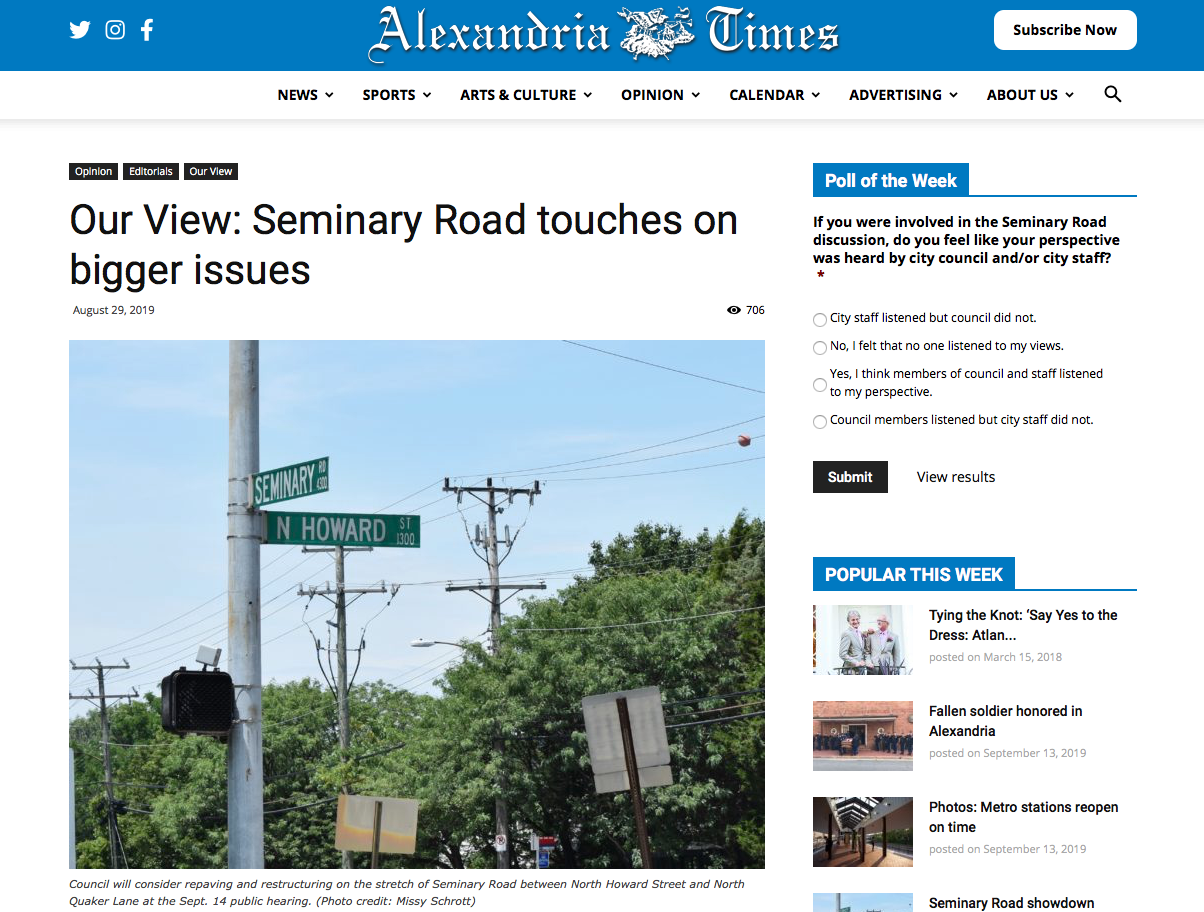An editorial board in a Missouri town warns that “impatient teens” are going to get themselves killed — by drivers who apparently have the right of way — if something isn’t done to solve the drop-off and pick-up problem at a local high school.
Another in Oregon questions whether city buses should be allowed to control traffic lights when they are running late, worried that such a move could somehow have an adverse affect on emergency vehicles.
And in Alexandria, Virginia, the paper of record demands city council members vote down plans to install a bike lane on a .9-mile stretch of a busy road — lest cars get slowed down.
Yes, local newspapers are still force-feeding us the myth of the American open road — something they have been doing since well before the screen door slammed and Mary’s dress swayed. Here are the latest examples:
Hedges and fences
The brain trust at the Joplin Globe in Missouri, tired of the way traffic flows —“or rather, doesn’t” — in front of Joplin High School, says the city must make the area safer for cars to save the lives of students who “dart higgledy-piggledy across 20th or across Indiana between cars driven by stressed parents and other frustrated drivers."

Apparently, it’s too much to ask drivers to stop being so impatient — or avoid the area altogether — during the few moments a day when kids are coming and going from school. Instead, the paper’s board demands the city build infrastructure, such as a pedestrian and bicycle overpass, so drivers can keep moving at breakneck speed.
Its most interesting suggestion? Planting hedges or installing fences — a la former New York City Mayor Rudy Giuliani’s controversial plan to corral Midtown Manhattan pedestrians back in the 1990s — to keep the kids out of the street.
We’re all for infrastructure that makes it safer for cars, pedestrians, and bicyclists to co-exist, but blaming the victim has to stop. Sure, kids should take necessary precautions before they cross a street, but drivers are ultimately responsible for who they let live and who they kill.
Or are they? As the editorial sums things up, “If the worst happens and we have failed to act, we won’t be able to call it an accident.”
No 'road diet'
Installation of bike lanes is always controversial in the Land of Freeway, but nowhere is it more irksome than on that .9-mile stretch of Seminary Road between North Howard Street and Quaker Lane in Alexandria, Virginia.
That’s why the editorial board at Alexandria Times took a deep dive into what it called a planned “road diet” of the aforementioned four-lane thoroughfare that leads from the city to I-395.
The paper first claims that everyone in town wants to keep the road the way it is. Then it argues that the stretch of road doesn't need fixing because it "isn’t as dangerous as the other end of the road where Seminary meets I-395.”
Then it disputes the experts, who said that the changes would not impact traffic, preferring to go with its gut: “We trust the civic associations – who represent more than 7,400 households in the area – when they say that yes, it would.”
So what would the paper do if the officials elect to put in the new bike lane? Well, vote them out of office.
“The community is being loud, and we know that council can hear them,” they wrote. “This is their chance to prove we were right in electing them.”
Alas, those members of council don’t seem to be quaking in their boots: They wisely approved the bike lane on Sept. 19.
Hold the bus!
Apparently, there are lots of questions to ponder when considering installing some weird new technology that allows buses approaching red traffic lights to switch them to green, thus keeping the bus — and everyone inside it — moving at a decent pace.
But what we are talking about here is high-tech stuff, and, you know, technology could create some, shall we say, unintended consequences.
That’s what the editorial board at The Bulletin of Bend, Oregon want to get to the bottom of in its Sept. 17 editorial.

“Would it conflict with giving emergency vehicles priority in getting through an intersection? Would public feedback be negative? Does the cost create enough of a benefit? Is there some other investment where the public would get more bang for its buck?”
All relevant questions, especially in a town where “car is king” and leaders will “continue to face pressure to make riding bikes safer.”
That said, we cheer the board which ultimately took the high road, suggesting the transit authority there needs to “experiment as it attempts to better serve Central Oregon.”
Bravo!
SF's Chicken Little
Earlier this month, editors at the SFGate.com in San Francisco ordered up a piece on the coming "traffic-apocalypse" when the new Chase Center opened with a Metallica concert in the town's Mission District.

Fearing there would be nowhere to park at the new home of the NBA's Golden State Warriors — which has "only about 900 parking spots for over 18,000 seats" — the story told readers where they could park at nearby private lots for "at the event rate of $7."
But the next day, fans who attended the show reported there weren't any problems.
"Traffic? What traffic" was the lede in the following day's story in the San Francisco Examiner, which noted that head-bangers heading to the concert "rode gliding Muni trains," "took swift-moving bus shuttles," "crested waves aboard ferries," "pedaled atop bikes," "canoodled romantically in pedicab carriages," and "zoomed on e-scooters" to the big show.
The story pointed out there was just "light traffic in the Mission" and that the "crippling traffic snarl that many feared never materialized."
The sky is falling, indeed.






